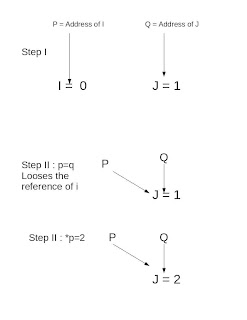However, in pointer semantics we deal with pointer, and anyone can change the value at the pointer location.
Consider the following program.
/*
* main.c
*
* Created on: Sep 18, 2010
* Author: administrator
*/
#include
void f (int * p, int * q) {
p = q;
*p = 2;
}
int i = 0, j = 1;
int main ( )
{
f(&i, & j);
printf("%d %d\n", i, j) ;
return 0;
}
The result will be 0 and 2. Why? Let me explain it to you.
We have two global variable i and j and we pass the pointer of these two variables to the function f. When we do p = q, we actually loose the reference of i, and we get two pointers namely p and q both pointing to j. then when we do * p = 2, we actually change the value of j to 2.
The whole thing can be depicted by the following diagram...
However, as we lost the reference of i in the step p = q, in the main program, the value of i that gets printed is the global variable that is 0. Hence we get the result as i = 0 and j = 2.
Hope this explains the pointer arithmetic to my students...

No comments:
Post a Comment